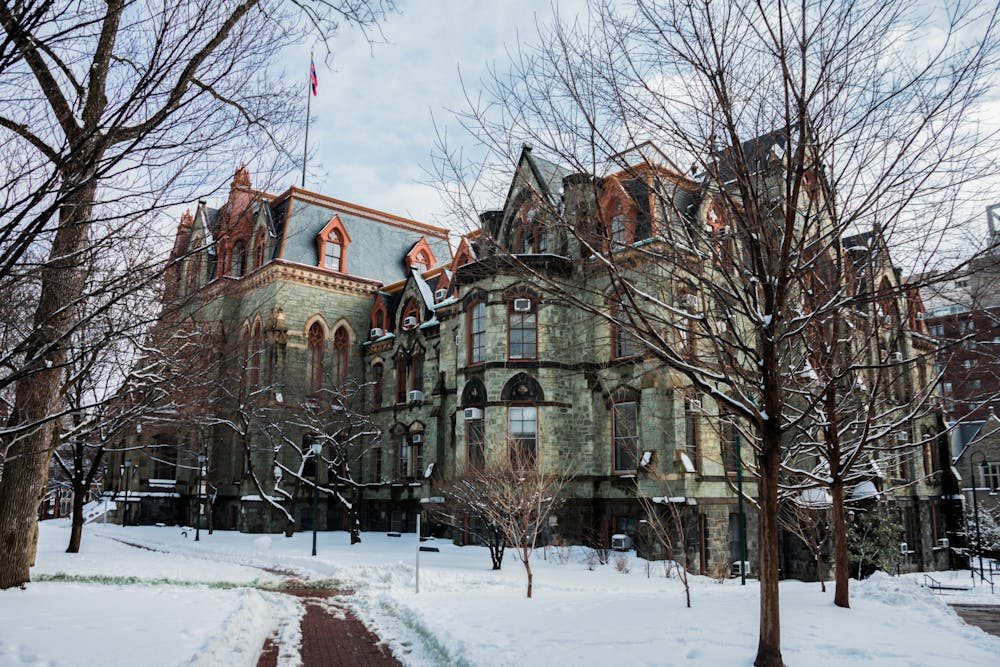
The new Penn First Plus office features study spaces, meeting rooms for one-on-one advising sessions, and lounge areas. (Photo from Marc Lo)
Penn First Plus opened its new office on the ground floor of College Hall this week, securing a hub for first-generation, low-income students on campus.
Occupying the space formerly used by Penn Admissions, the P1P office covers 2,538 square feet of space and features study spaces, meeting rooms for one-on-one advising sessions, and lounge areas, according to P1P Executive Director Marc Lo. Students praised the opening of the office as a vital step in creating space for FGLI students at Penn.
As of Feb. 3, students are able to make an appointment to visit the office on Mondays, Wednesdays, or Fridays to speak to a director at P1P or for support with technology obtained through P1P, Lo said. He added that he hopes students will be able to use the study rooms in accordance with health guidelines this semester.
Penn first announced the construction of the P1P office as a space for FGLI students in May 2018. Construction for the office began in September 2019 and finished in August 2020. It was slated to open for the 2020-2021 academic year until the pandemic caused the office to close for the fall semester, Lo said.
Prior to the opening, P1P had no physical place to call its own, Lo said.
“Until this point, we were borrowing offices from the Vice Provost for Research who was kind enough to give us two desks on the first floor of College Hall,” Lo said.
Talks about creating a space for FGLI students preceded Lo's tenure, which began in January 2019, Lo said, adding that seeing the office through to completion has been a priority for him.
Lo said that he envisioned a space where students and advisors — both financial and academic — could meet in one-on-one sessions in meeting rooms. In the future, Lo said he hopes to add a free printing station and coffee machine for student use.

Penn First Plus has opened its newly renovated office on the ground floor of College Hall, which covers 2538 square feet of space and will create a place where FGLI students can gather and find resources.
While redesigning the space, Lo consulted with students on the 2019 P1P Student Advisory Board, who he said were instrumental in providing advice and feedback.
“The reason we have the study rooms is because of student feedback that more space [for FGLI students] was needed on campus, especially equipped with technology to do group work,” Lo said. “Students also helped us pick out the furniture and how to arrange it in a way to make it an inviting space.”
College and Wharton senior Karen Herrera, who sat on the advisory board while P1P was designing the office, said that the board prioritized making the office feel “homey” to students.
“We had to emphasize that we wanted it to feel like a place where people would want to go just to hang out to do their homework,” Herrera said.
Herrera and the advisory board also wanted to create a “modern” space that students could access and find easily, adding that many students feel that identity-based spaces on campus are not visible enough.
“I brought this concern up when we were talking about remodeling the space. With the cultural houses, students feel like it’s almost a hidden part of campus because they’re in the basement of ARCH,” she added.
In 2016, Penn became the second Ivy League institution, after Brown University, to create a resource center for FGLI students when it announced the creation of the FGLI Center. Students said that the FGLI Center, housed in the Greenfield Intercultural Center, acted as a central hub for many FGLI students. The GIC FGLI Program runs the FGLI food pantry, various programming for students, and housed the FGLI donated textbook library until this year, when the collection moved to Van Pelt.
College senior Sakshi Sehgal, who identifies as a FGLI student, said that prior to the opening of the P1P office, the GIC was her go-to physical space for FGLI resources and support from faculty and staff.
“One of the physical spaces that I would often go to is the GIC, whether it be to speak with professional mentors or faculty,” Sehgal said.
Sehgal serves on the Penn First board, a FGLI student organization, which has hosted general body meetings at the GIC. She said that while the Penn First board has not formally discussed whether it would use the P1P office to host meetings, she believed the board would be open to the idea after the pandemic.
"I definitely envision it as being, in a post-[COVID-19] setting, a great place to hold events,” Sehgal said.
Lo said that he looks forward to the upcoming fall semester in anticipation of more freedom from restrictions implemented in light of the pandemic.
“Next fall is going to be a fun experiment to see how students end up using the space,” Lo said.
Students — including Herrera — said the new office is important for creating a community for FGLI students at Penn.
“If you’re the first person in your family to [go to college], if you’re low income, and you compare yourself to your more affluent peers, you want to make it so that students get to really feel that sense of belonging,” Herrera said.
The Daily Pennsylvanian is an independent, student-run newspaper. Please consider making a donation to support the coverage that shapes the University. Your generosity ensures a future of strong journalism at Penn.
Donate







